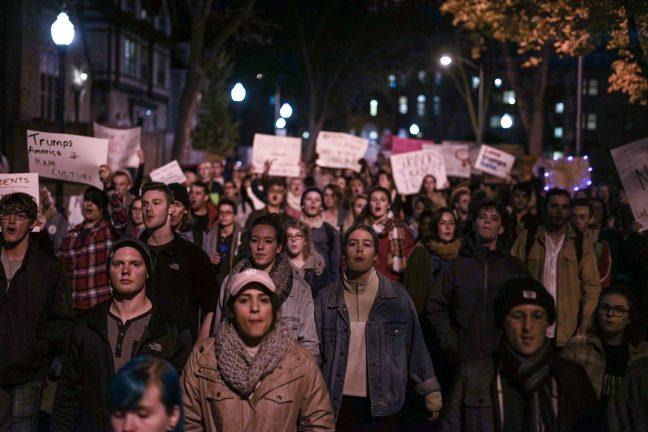Last week, students were greeted with a crime warning in their university email inboxes from the University of Wisconsin Police Department. The crime warning reported a sexual assault had occurred at an unknown fraternity and the suspect and the victim were known to each other. The warning clarified there was no investigation of the incident taking place because the victim did not express the desire to formally report the assault to authorities.
A day later, another crime warning was sent out from the UWPD to inform students of a sexual assault in a southeast dorm. Similar to the first crime warning, the email stated that because the incident was reported to UW and not to law enforcement, there was no police investigation of the event. The email went on to declare that “sexual assault is never the fault of the victim,” and made some suggestions to create a safe, respectful campus environment including getting consent and speaking up in situations that don’t feel right.
https://badgerherald.com/news/2017/10/18/doj-launches-website-tracking-backlog-of-untested-sexual-assault-kits/
Two crime warnings in two days about sexual assault echo some of the events of the #MeToo and #TimesUp movements. The movements encourage victims of sexual assault to tell their stories for the purpose of exposing the crushing realities of sexual harassment and pursuing accountability. Harvey Weinstein dominated the news for weeks as the number of women accusing him of sexual misconduct and harassment climbed even higher. The ongoing story shocked Americans, but this type of headline quickly ceased to be unique. In these monumental movements, survivors of sexual harassment, both men and women, are coming forward with stories that they have kept to themselves for years. They are demonstrating the potential of a community to rise up in solidarity with one another and demand change.
These movements found their momentum at a pivotal time in history. The Rape, Abuse, & Incest National Network reported one out of every six American women have been the victim of an attempted or completed rape. Rape and sexual assault still happen all the time, outside the workplace and in, on-campus and off, to people of every gender, race, and socioeconomic status. That is exactly why the #MeToo and #TimesUp movements are still fighting. Sexual harassment as an issue doesn’t end with an actor being fired or a politician stepping down — it is a work in progress with emphasis on the work.
https://badgerherald.com/opinion/2017/12/12/increasing-conversation-about-hypermasculinity-male-libido-central-to-fight-against-sexual-assault/
College students have everything to do with the waves of accusations and exposure of sexual misconduct and harassment across the country. RAINN reports that college women ages 18-24 are at an elevated risk of sexual assault compared to all women in America. Nearly 23.1 percent of undergrad females and 5.4 percent of undergrad males “experience rape or sexual assault through physical force, violence, or incapacitation.”
UW has joined the fight against sexual harassment, working to see some change in dismal statistics. Tour guides point out the emergency phones stationed all over campus. Freshmen are required to take an online seminar to learn about consent, how to avoid being a passive bystander and how to stay safe walking around Madison and around campus. University Health Services has a whole page full of resources for survivors of sexual assault. But at the end of the day, UW isn’t some special exception to these statistics. It’s a university where students get two emails in two days about on-campus sexual assaults.
https://badgerherald.com/opinion/2017/10/17/if-youre-shocked-by-metoo-youre-actively-contributing-to-the-problem/
As horrible as it was to hear about the events last week, and to experience for the survivors that reported them to the university, maybe it’s a good thing there have been more emails disclosing the reality of sexual assault and harassment than the university has received all year. Getting emails means that students are reporting what happened to them, even if they don’t want a police investigation. Getting emails means more people are willing to face the staggering statistics around sexual assault on college campuses and do something about them. Getting campus-wide emails means other survivors have a chance to see they are not alone and they will be heard and supported should they choose to report what happened to them.
The two emails weren’t long, but they spoke so much louder in a time when thousands of people are forming movements to break the trend of silence and lack of accountability for perpetrators of sexual harassment.
Juliet Dupont (jdupont@wisc.edu) is a freshman intending to major in political science and journalism.


